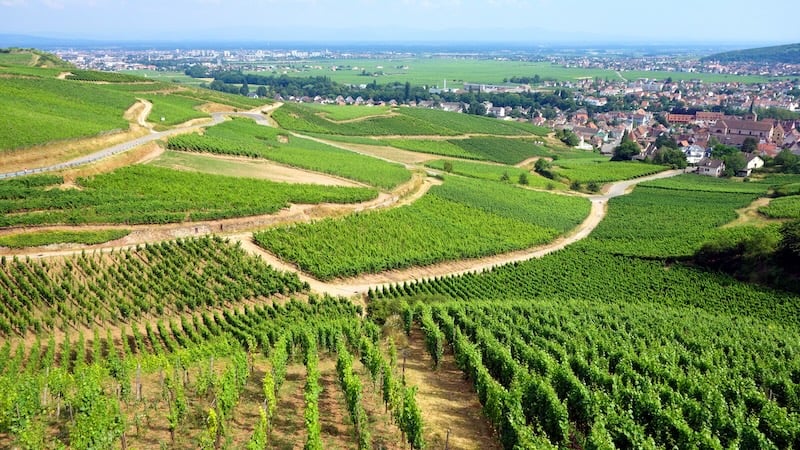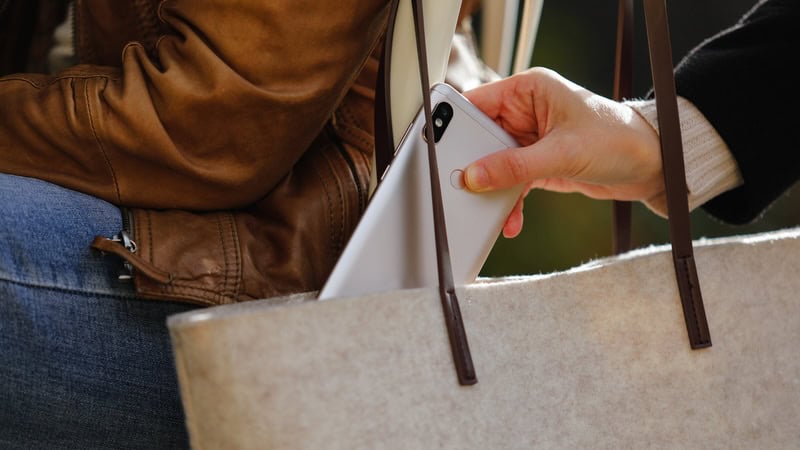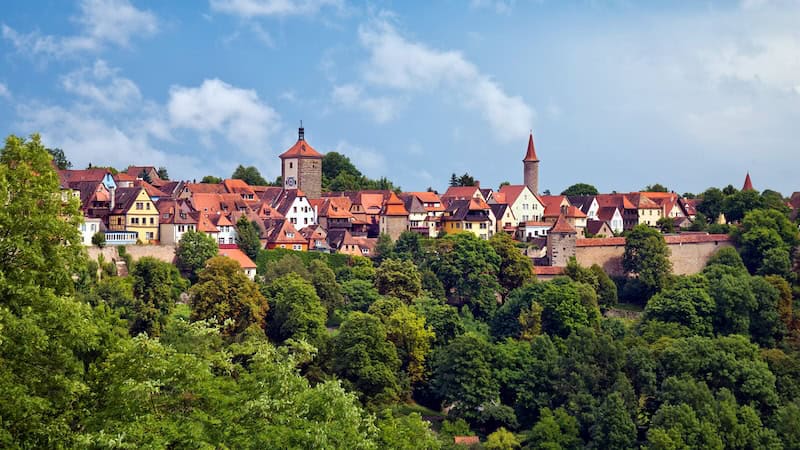Eye-Popping Rotterdam
Art and architecture, food, views – and bluegrass!
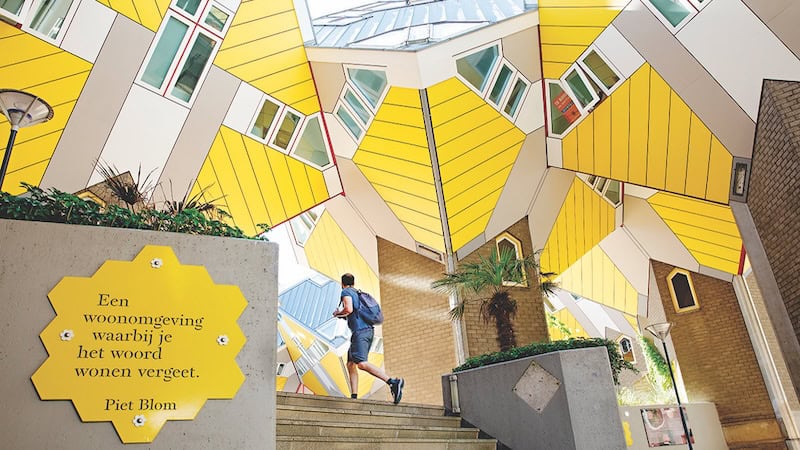
Historic Rotterdam, the second-largest city in the Netherlands, provides glimpses of amazing architecture, art, food, unique hotels, and even an annual bluegrass festival. Travel writer and baby boomer Peggy Sijswerda takes us there.
I’m standing in a crowd listening to the twinkling sounds of banjo music. Surrounding me are smiling faces both young and old: families with kids, seniors, bearded millennials, even a few folks dressed in overalls and straw hats. I could be anywhere in Virginia tapping my foot to the sounds of bluegrass, but I’m across the pond in the Netherlands at the Rotterdam Bluegrass Festival. I feel right at home.
Peter and I are spending some time in the Netherlands this summer, and when I saw an announcement for this bluegrass festival, I jumped at the chance to combine two of my favorite things: chilling at an outdoor music festival and exploring a new city. So we started planning a four-day getaway to Rotterdam.
I didn’t know much about the Netherlands’ second largest city other than it was bombed heavily in WWII, it has a huge port, and its architecture is modern and innovative. The more I researched what the city has to offer, the more I realized Rotterdam was a perfect place to visit. The bluegrass festival would be an added bonus. Yee-haw!
Rotterdam Bluegrass Festival: Musicians from Virginia & around the world
The three-day music festival is the brainchild of Guido de Groot, a Rotterdam resident and bluegrass aficionado, who saw an abandoned bandstand in a park and had a dream. The first festival in 2009 welcomed 250 attendees. This year’s event attracted 10,000 music lovers as well as bluegrass bands from the U.S. (natch!), Canada, New Zealand, the Netherlands, Spain, Argentina, Sweden, and more.
The event takes place in a lovely wooded park with shade trees that help deter both sun and rain – what’s a festival without a little rain? We arrived on Friday afternoon in time to catch “Them Peckin’ Boys,” a Dutch band who play traditional tunes, and Katja Kruit, whose melodic singing and dobro playing captured the crowd.
Next local schoolchildren played on stage: first a group with fiddles and then a larger group with ukuleles. A local initiative provides free instruments and lessons as a way of introducing bluegrass to the next generation. “The alumni of this school project are destined to someday form a band that, armed with bluegrass music, will surely conquer the world,” the festival’s website proclaims.
Peter and I popped in and out of the festival all weekend and heard some awesome music. We loved the Rotterjam Stage, where guest musicians met and jammed along with folks from the audience. Vendors offered beer, pizza, BBQ, burgers, and more to hungry festival goers, along with plenty of merch.
The funniest thing to me was the porta-potty village. A 1x visit cost 50 cents, but you could also buy a day pass to the village for about $4. It’s not unusual to pay to use the bathroom in the Netherlands, but on the bright side, the toilets are very clean.
See 360° degree views on the Euromast and Depot Boijmans for amazing art
Booking an affordable hotel in Rotterdam on a summer weekend proved difficult, so we opted for one in a neighboring town: the Leonardo Hotel in Papendrecht, which was connected to Rotterdam by a convenient waterbus. Each morning Peter and I filled up at the hotel’s fantastic breakfast buffet: croissants, meats and cheese, fruit, yogurt, smoothies, bacon and sausage, and made-to-order omelets and then walked to the waterbus for a 40-minute cruise to the city center.
What a relaxing way to ride to and from the city, and it’s just one of the options included in the Rotterdam tourist day ticket ($17), which covers all RET-branded transportation in the Rotterdam region, including The Hague, Delft, and Gouda.
Whenever I go to a new city, I always check the local calendar of events. The Japan & Korean Food Festival in Het Park sounded like a good place to grab lunch, and it was right on the way to the EuroMast, Rotterdam’s most popular tourist attraction.
People lined up to get in the festival, so it was instantly packed. But plenty of food vendors ensured hungry patrons didn’t have to wait long. I enjoyed a delicious, fat sushi roll with tuna and avocado, and Peter had a poke bowl. I looked longingly at the silent disco tent, but we had places to go and things to see.
The EuroMast towers over Rotterdam and offers some of the most eye-popping views of the city skyline. Built in 1960, the concrete structure was the tallest building in Rotterdam for many years, and when it was eclipsed by another building, an additional 279 feet were added, making it 606 feet high. The general ticket takes you to the original viewing platform, but you can pay extra to ride to the very top on Euroscoop, a revolving ride combining 360° views of Rotterdam with music and a light show. Not to be missed!
Next stop was Depot Boijmans Van Beuningen, one of Rotterdam’s architectural icons. Its ovoid or bowl-like shape is covered with 1,664 mirrored panels reflecting trees, passersby, and nearby buildings. The Depot houses not only a stunning display of art from the museum next door (currently closed for renovation), but is also the world’s only publicly accessible art storage space, housing more than 154,000 objects: paintings, metal objects, organic and non-organic materials, and photography.
Unfortunately, the next tour was full, so Peter and I could only access the gallery that displayed a few of the museum’s prized paintings and sculptures. I loved René Margritte’s Not To Be Reproduced. It’s a portrait of a young man looking into a mirror. You see him from behind, but in the image in the mirror, his back still faces the viewer. “Magritte was inspired by the mystery of the everyday,” the museum’s app notes.
Don’t miss the cube houses – then grab a bite at The Market Hall
Architecture could be described as the “mystery of the everyday,” particularly for those of us who aren’t architects or engineers. Rotterdam’s famous Cube Houses built in 1984 by Piet Blom are another example of the city’s world-class architecture. Seeming to defy gravity, 38 bright yellow dwellings with slanted walls perch on pilings at odd angles that make you wonder how people can live in them without experiencing vertigo. Fun fact: a youth hostel is housed in a few of the cubes, offering affordable dorm accommodations and private rooms.
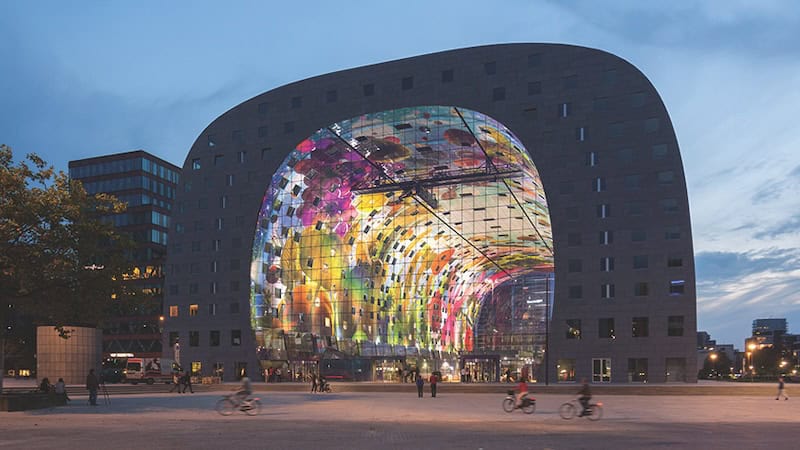
Across the square from the Cube Houses is The Markthal or Market Hall, Europe’s largest indoor market, soaring to a height of 131 feet (approx. 12 stories). Shaped like a huge horseshoe, the building also features 150 apartment homes built into the sides and top. When you enter the market at ground level, your eyes are drawn upwards to the ceiling, which features a colorful painting called “Horn of Plenty” by Arno Coenen and Iris Roskamby.
Then there’s the food. In addition to vendors and grocers selling everything and anything your heart desires: flowers, cheese, chocolate, homemade peanut butter, fresh herring, cannelloni, stroopwafels, produce, and more, eighteen restaurants tempt you with fare from around the world.
One evening we dined at 21 Pinchos, which serves Basque-style tapas. Peter and I love sharing plates, so this was perfect. We enjoyed padron peppers, ham croquets, and of course patatas bravas. Next to the bar area where we sat, a jazz combo provided entertainment as part of the North Sea Jazz Festival. The vibrant vibe at The Markthal made it one of my favorite places in Rotterdam.
Spido Tours, Remastered, and Kinderdijk are must-sees in Rotterdam
Of course, it’s impossible to explore a big city like Rotterdam in a four-day visit. We missed a few museums that I would have liked to see, but here are three experiences that I highly recommend.
Spido Tours ply the waters of the Oude Maas showing visitors Rotterdam by boat. On the Rotterdam Harbor Tour, we learned how the city grew from a fishing village to an international center of trade, transport, and industry. We passed by the “juice terminal,” for example, where ships from South Africa and South America transport fruit concentrate to make juice that is then delivered across Europe. In total, from 15,000 to 20,000 cargo ships pass through Rotterdam each year.
Remastered, Peter’s favorite activity in Rotterdam, is an indoor experiential attraction next to the Erasmus Bridge. During the 60-minute immersive experience, guests move through different rooms featuring audio-visual representations of paintings by the Dutch masters intermingled with art by more contemporary Dutch artists. Truly a feast for the senses, Remastered enthralls every step of the way. The grand finale takes you on an extraordinary journey through a variety of paintings. As you sit or stand in the room, paintings around you come alive, and upbeat music adds excitement. It’s surreal in every sense of the word. remastered.nl
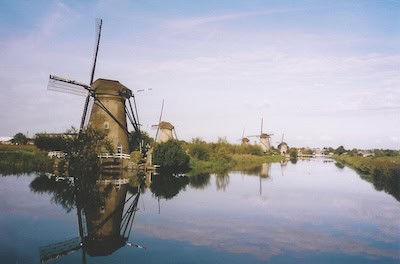
Kinderdijk is a UNESCO World Heritage site and home to 19 windmills. Throughout history windmills have been a strategic part of the Netherlands’ effort to manage water in this low-lying country. You can visit the inside of a windmill and see its inner-workings and also how the millworker and his family lived. A boat tour (included in the admission) takes you along the main canal and provides awesome photo ops. I loved standing next to a windmill and watching the blades turn round and round and feeling and hearing the power of the wind.
Walk in the footsteps of history: Hotel New York and ss Rotterdam
Two recommended places to stay in Rotterdam are the Hotel New York and the ss Rotterdam, owned by the same company, a family-owned Dutch hotel group called Westcord. Both are convenient to the city center, and each has its own particular charm.
Built in 1903, the Hotel New York is the former home of the Holland-America Line in Rotterdam. Perched on a quay facing southwest, the building became the departure point for thousands of emigrants who left the Old Country to begin new lives in North America. Miraculously, it survived the bombing by Germany in 1940.
Today, the hotel honors its maritime past with nostalgic touches throughout. In addition to 72 spacious rooms, the hotel, which opened in 1993, has two restaurants, an oyster bar, and a gorgeous terrace facing the river. Whether you stay overnight, enjoy a drink on the terrace, or dine in one of its fine restaurants, you’ll become part of the Hotel New York’s lively tradition of hospitality and adventure. As the website notes, “The instant you enter the building, you can feel it; here is where it all happened.”
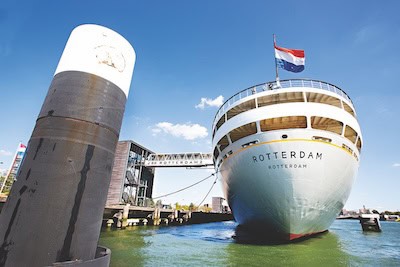
A short walk away, the ss Rotterdam, launched in 1951, has transitioned from the former flagship of the Holland America Line into a unique hotel renowned for its cultural-historical value. On board guests can experience the grandeur of the last century when the “Grand Dame” carried 1200 passengers to and from New York and on cruises to exotic destinations.
Peter and I extended our Rotterdam visit in order to enjoy an overnight on the ship. Our spacious room featured 50s-style décor and two portholes with views of the Rotterdam skyline. Much of the ship maintains a mid-century appearance with original décor and furniture. Guests can take a self-guided tour of the ss Rotterdam and, accompanied by volunteers, view the ship’s original public spaces.
The tour also includes a brief movie that depicts elegant guests dressed in ’50s cocktail attire dining and dancing on board. A visit to the bridge shows visitors what it was like to navigate such a large ship. The adjacent officer’s quarters look as if they were frozen in time.
Meals on the ss Rotterdam are served in the Lido Grill, which offers dining al fresco on the teak decks. Unfortunately, when Peter and I lunched at the Lido Grill, the weather didn’t cooperate. Nevertheless, we enjoyed our salads as well as a sumptuous breakfast the next morning.
Both Hotel New York and ss Rotterdam invite guests to experience a unique connection to Rotterdam’s storied past. There’s even a package called The Holland-America Line package, which includes a night at each property. Take a walk in the footsteps of history the next time you visit Rotterdam!
A visit to Rotterdam is nice anytime of the year, but being able to enjoy the bluegrass festival made our weekend even more special. As music played and the sun sank down on the last day of the festival, I felt like I was surrounded by my tribe, even though I was far from home. It’s a good feeling to know.
For more information, visit en.rotterdam.info.
TOP FEATURE PHOTO: Kubus / Cube Houses in Rotterdam. CREDIT: Iris van den Broek
Rick Steves takes us to Eclectic Amsterdam
Peggy Sijswerda is the editor and publisher of Tidewater Family Plus magazine. She has an MFA in creative nonfiction from Old Dominion University and is the author of Still Life with Sierra, a travel memoir. Peggy also freelances for a variety of regional, national, and international magazines.
